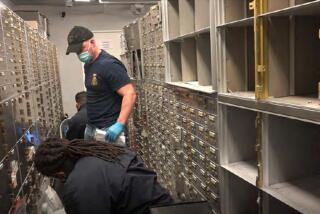Letters: DNA collection done right
Re “Court goes too far on DNA,” Editorial, June 4
The U.S. Supreme Court got it absolutely right in finding that it is constitutional for DNA to be collected at the time of arrest and checked against a national database of unsolved cases. The Times’ claim that doing so violates an arrestee’s 4th Amendment rights is off base.
The 4th Amendment prohibits only unreasonable searches, and case law through the years has found it reasonable for law enforcement to collect a number of identifying traits at the time of arrest. For example, photographs and fingerprints taken shortly after a person is arrested are checked against large databases. DNA is no different, and its collection is not a violation of the 4th Amendment.
The beliefs that DNA collection is inherently more intrusive and that it creates vast reservoirs of personal information are uninformed. We quickly swab cheeks to collect DNA samples, a much faster and easier process than the old-fashioned routine of having a set of fingerprints rolled. And besides, if intrusiveness were truly the issue, we could switch to the unintrusive collection of touch DNA. Plus, nothing in the DNA markers we use in our national database contains anything that could identify physical characteristics; this genetic material is called “junk DNA” precisely for this reason.
The Supreme Court’s decision combines good law with good science, and it will make all of us safer in its application.
Charlie Beck
Los Angeles
The writer is chief of the Los Angeles Police Department.
The majority’s ruling flies in the face of the 4th Amendment. Taking a swab from virtually anyone suspected of a crime is unreasonable search and seizure.
We have lost many of our constitutional rights since the Homeland Security Act was passed in 2002. I realize we must protect people from terrorism and other crimes, but not to the extent that we lose that which makes the United States stand alone in the world.
Of course convicting perpetrators of crimes is an honorable goal. But do it correctly. This is like throwing spaghetti against the wall and seeing which strands stick.
Chuck Rinaldi
Huntington Beach
The Times found the Supreme Court’s majority argument for allowing the collection of DNA samples — namely that it lets law enforcement verify the identity of people taken into custody — to be “disingenuous.” This wasn’t the majority’s only rationale.
Collecting DNA serves the same purpose and is no more intrusive than collecting fingerprints. Just as with DNA, fingerprints can be used to link people to crimes. Fingerprints are unique to an individual; so is DNA. The difference is that DNA is more plentiful and more powerful as evidence. But that is no reason to disallow it.
Finn Sveen
Redlands
It is interesting that Supreme Court justices on both the left and the right (and those in the general public who share their view) praise DNA when it exonerates people on death row but now oppose its collection at the time of someone’s arrest.
But that collection can only prevent innocent people from going to death row in the first place while making sure that the guilty people do go there.
Robert S. Henry
San Gabriel
ALSO:
Letters: Suicide and the lessons of loss
Letters on letters: Marriage and families
Letters: By golly, why not an L.A. trolley?
More to Read
A cure for the common opinion
Get thought-provoking perspectives with our weekly newsletter.
You may occasionally receive promotional content from the Los Angeles Times.






